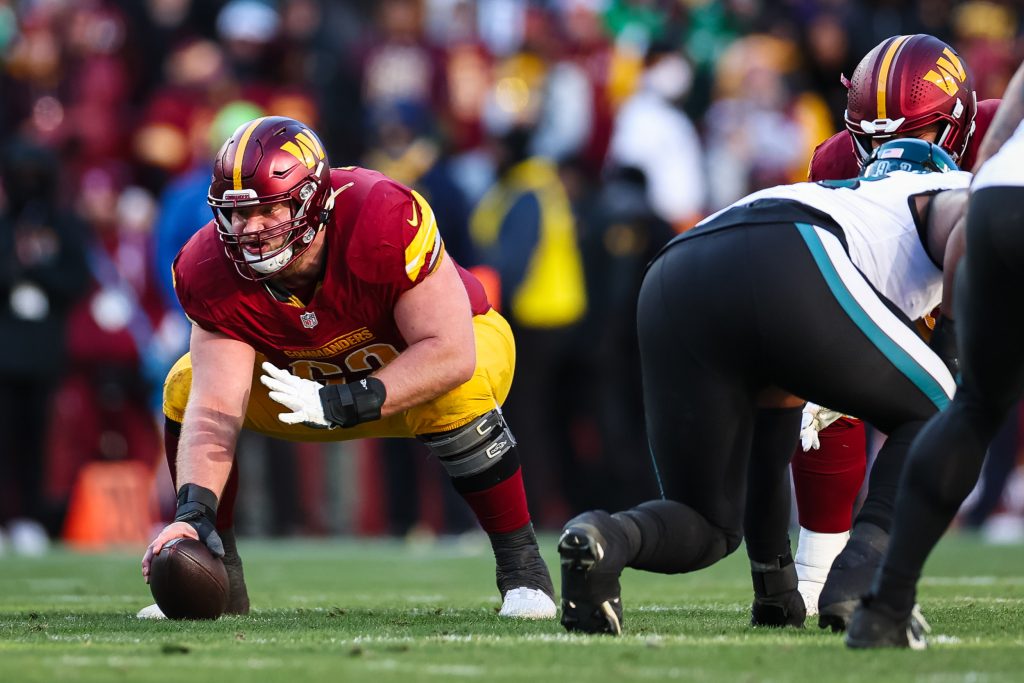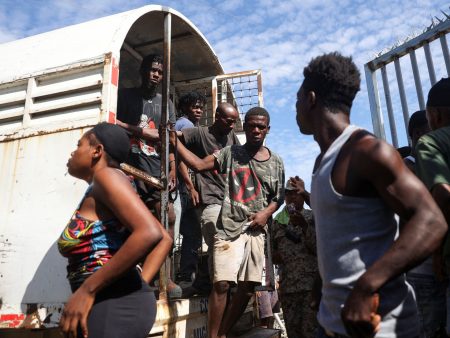The Washington Commanders, striving for their eleventh victory of the season, faced a setback during their game against the Atlanta Falcons. Starting center Tyler Biadasz suffered a leg injury in the second quarter, significantly impacting the team’s offensive line. Biadasz was injured during a routine blocking play, where he was rolled upon by another player, his leg pinned beneath a Falcons defender. The immediate aftermath saw Biadasz writhing on the field in apparent pain, raising concerns about the severity of the injury. Though he eventually managed to walk off the field under his own power, his noticeable limp suggested potential damage. Medical personnel quickly ushered him to the sideline medical tent for a preliminary assessment. Following this initial examination, the decision was made to move Biadasz to the locker room for further evaluation, indicative of a potentially more serious injury. The team later announced he would not return to the game. This unexpected turn of events forced the Commanders to adjust their offensive strategy mid-game, impacting their offensive line cohesion.
The loss of Biadasz, a key component of the Commanders’ offensive line, introduced an element of uncertainty into the team’s game plan. His absence created a ripple effect, necessitating adjustments in blocking schemes and player assignments. The offensive line, responsible for protecting the quarterback and opening running lanes, is a unit that relies heavily on coordinated movement and communication. Biadasz’s departure disrupted this carefully orchestrated mechanism, forcing the Commanders to adapt on the fly. The team had to rely on backup center Nick Martin to fill the void, a change that inevitably affects the dynamics of the offensive line. Martin, while a capable player, lacks the same level of experience and established chemistry with the other linemen, potentially impacting the team’s overall offensive performance.
The injury to Biadasz underscored the inherent risks of professional football, where the physical demands of the game can lead to unpredictable injuries. The violent nature of the sport, with its frequent high-impact collisions, makes players susceptible to a wide range of injuries. The offensive line, in particular, is often involved in intense physical engagements, increasing the likelihood of injuries. Biadasz’s unfortunate incident served as a stark reminder of the precarious nature of player health in such a demanding sport. The incident also highlighted the importance of depth on the roster. A team’s ability to overcome injuries and maintain performance levels often depends on the quality of its backup players.
The long-term implications of Biadasz’s injury remain uncertain, pending the results of further medical evaluations. The severity of the injury will dictate the length of his absence from the field and the required rehabilitation process. A minor injury might require only a short period of rest and recovery, allowing him to return to the lineup relatively quickly. However, a more significant injury could sideline him for an extended period, potentially impacting the team’s playoff aspirations. The Commanders’ medical staff will undoubtedly conduct thorough examinations, including imaging studies, to determine the precise nature and extent of the damage. This information will guide the development of a tailored treatment and rehabilitation plan to ensure Biadasz’s safe and effective return to the game.
The incident also cast a shadow over the Commanders’ pursuit of their eleventh win. While the team continued to compete, the loss of a key player like Biadasz undoubtedly impacted their overall performance and strategic options. The offensive line, now operating with a reshuffled lineup, faced a greater challenge in executing its assignments. This disruption could potentially affect the team’s ability to consistently move the ball, score points, and ultimately secure the victory. The Commanders coaching staff had to make adjustments to their game plan, accounting for the change in personnel and striving to maintain offensive efficiency. The team’s ability to adapt to this unexpected adversity would be a crucial factor in determining the game’s outcome.
The injury to Tyler Biadasz serves as a reminder of the unpredictable and often unforgiving nature of professional football. The demanding physicality of the sport exposes players to the risk of injuries, which can occur suddenly and dramatically alter the course of a game, a season, or even a career. While the Commanders continue their pursuit of victory, the incident underscores the importance of player health, roster depth, and the ability to adapt to unforeseen circumstances. The full extent of the injury and its impact on both Biadasz and the team will only be revealed with time and further medical assessment. As the team moves forward, they will need to rally around their backup players, adjust their strategies, and maintain their focus on achieving their season goals.










